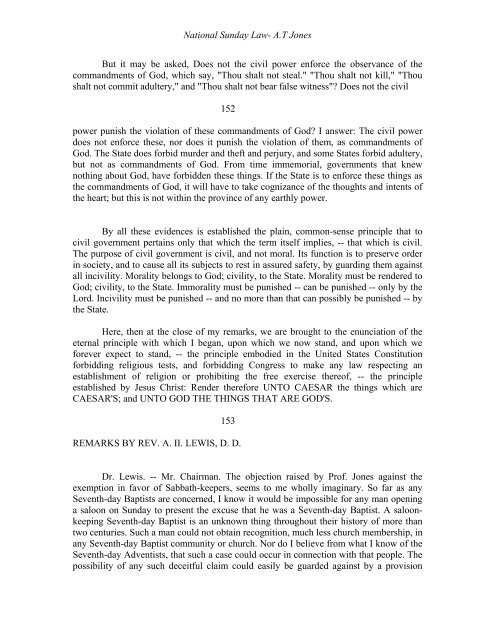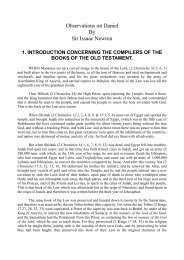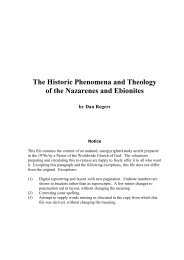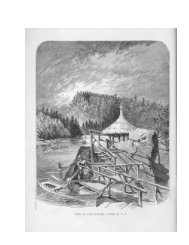THE NATIONAL SUNDAY LAW, ARGUMENT OF ALONZO T ...
THE NATIONAL SUNDAY LAW, ARGUMENT OF ALONZO T ...
THE NATIONAL SUNDAY LAW, ARGUMENT OF ALONZO T ...
You also want an ePaper? Increase the reach of your titles
YUMPU automatically turns print PDFs into web optimized ePapers that Google loves.
National Sunday Law- A.T Jones<br />
But it may be asked, Does not the civil power enforce the observance of the<br />
commandments of God, which say, "Thou shalt not steal." "Thou shalt not kill," "Thou<br />
shalt not commit adultery," and "Thou shalt not bear false witness"? Does not the civil<br />
152<br />
power punish the violation of these commandments of God? I answer: The civil power<br />
does not enforce these, nor does it punish the violation of them, as commandments of<br />
God. The State does forbid murder and theft and perjury, and some States forbid adultery,<br />
but not as commandments of God. From time immemorial, governments that knew<br />
nothing about God, have forbidden these things. If the State is to enforce these things as<br />
the commandments of God, it will have to take cognizance of the thoughts and intents of<br />
the heart; but this is not within the province of any earthly power.<br />
By all these evidences is established the plain, common-sense principle that to<br />
civil government pertains only that which the term itself implies, -- that which is civil.<br />
The purpose of civil government is civil, and not moral. Its function is to preserve order<br />
in society, and to cause all its subjects to rest in assured safety, by guarding them against<br />
all incivility. Morality belongs to God; civility, to the State. Morality must be rendered to<br />
God; civility, to the State. Immorality must be punished -- can be punished -- only by the<br />
Lord. Incivility must be punished -- and no more than that can possibly be punished -- by<br />
the State.<br />
Here, then at the close of my remarks, we are brought to the enunciation of the<br />
eternal principle with which I began, upon which we now stand, and upon which we<br />
forever expect to stand, -- the principle embodied in the United States Constitution<br />
forbidding religious tests, and forbidding Congress to make any law respecting an<br />
establishment of religion or prohibiting the free exercise thereof, -- the principle<br />
established by Jesus Christ: Render therefore UNTO CAESAR the things which are<br />
CAESAR'S; and UNTO GOD <strong>THE</strong> THINGS THAT ARE GOD'S.<br />
153<br />
REMARKS BY REV. A. II. LEWIS, D. D.<br />
Dr. Lewis. -- Mr. Chairman. The objection raised by Prof. Jones against the<br />
exemption in favor of Sabbath-keepers, seems to me wholly imaginary. So far as any<br />
Seventh-day Baptists are concerned, I know it would be impossible for any man opening<br />
a saloon on Sunday to present the excuse that he was a Seventh-day Baptist. A saloonkeeping<br />
Seventh-day Baptist is an unknown thing throughout their history of more than<br />
two centuries. Such a man could not obtain recognition, much less church membership, in<br />
any Seventh-day Baptist community or church. Nor do I believe from what I know of the<br />
Seventh-day Adventists, that such a case could occur in connection with that people. The<br />
possibility of any such deceitful claim could easily be guarded against by a provision
















